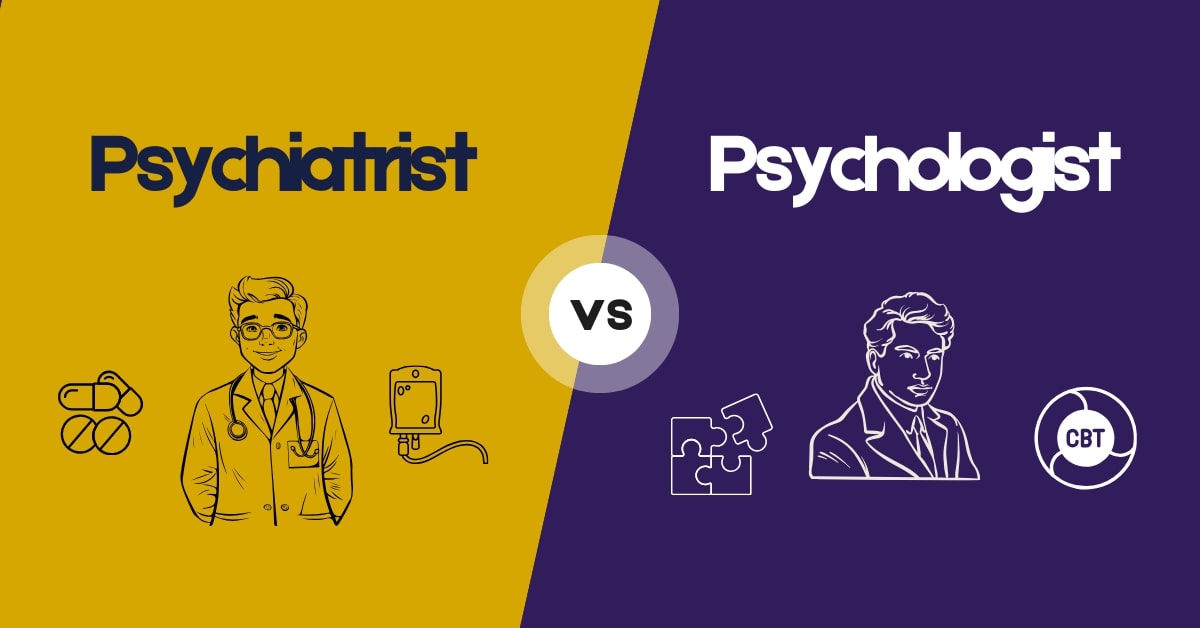What is the difference between a psychologist and psychiatrist?
When you’re struggling with your mental health or trying to support someone who is, knowing where to turn can be confusing. You might have heard the terms “psychiatrist” and “psychologist” used interchangeably but they’re not the same.
Both professionals are trained to help people manage mental health challenges, but they do so in different ways. One can prescribe medication; the other focuses on therapy. Both are equally important, and sometimes, people benefit from seeing both.
This guide breaks down the difference between psychiatrists and psychologists, what they do, how they’re trained, and how they can support you. Whether you’re looking for treatment options or simply curious about the mental health field, this article will help you understand the difference between a psychiatrist and psychologist.
What is a Psychiatrist?
A psychiatrist is a medical doctor who specializes in mental health. That means they’ve been to medical school just like any other doctor, then completed further training in the diagnosis and treatment of mental illnesses.
Because of their medical background, psychiatrists are the only mental health professionals who can prescribe medications such as antidepressants, mood stabilizers, or antipsychotic drugs.
Psychiatrists may work in hospitals, community mental health clinics, or private practice. Some also provide talk therapy, but more often, their focus is on diagnosis and medication management.
What is a Psychologist?
A psychologist is a university-trained mental health professional who specializes in how people think, feel, behave, and learn. They are not medical doctors, but they do have advanced training usually a Master’s degree or a PhD in psychology.
Unlike psychiatrists, psychologists don’t prescribe medication. Instead, they focus on talk therapies such as cognitive behavioral therapy (CBT), acceptance and commitment therapy (ACT), psychoanalysis or trauma-focused therapy. These are proven approaches that help people learn how to manage stress, anxiety, depression, or emotional difficulties.
Also Read: How Can Therapy Help with Mental Health
Key Differences: Psychiatrist vs Psychologist
| Category | Psychiatrist | Psychologist |
|---|---|---|
| Education | Medical doctor (MBBS/MD) with specialist training in psychiatry. | Master’s or Doctorate in psychology. |
| Main Role | Diagnoses mental illness, prescribes and manages medication. | Provides therapy, coping strategies, and psychological testing. |
| Approach | Medical/biological focus. | Therapy/behavioral focus. |
| Can Prescribe Medication? | ✅ Yes | ❌ No |
| Type of Help | Best for severe conditions (schizophrenia, bipolar disorder, severe depression, suicidal thoughts). | Best for emotional/behavioral issues (stress, anxiety, trauma, relationship problems, personal growth). |
| Session Style | Shorter (15-30 min) after first assessment, medication check-ins. | Longer (45-60 min) talk therapy sessions. |
| Work Settings | Hospitals, psychiatric units, private practice. | Clinics, schools, private practice, rehab centers. |
| When to See First | • Hallucinations, mania, suicidal thoughts • Severe depression • When therapy alone isn’t enough | • Feeling anxious, low, or unmotivated • Coping with trauma, grief, or stress • Relationship or identity struggles • ADHD, autism, learning assessments |
They’re Both On Your Side
Don’t get caught up in the labels. Both psychologists and psychiatrists want the same thing your healing.
You’re not weak for needing help.
You’re not dramatic for not being okay.
And you definitely don’t need to hit “rock bottom” to book a session. If your chest feels heavy and your thoughts are noisy, you’re allowed to seek support.
Psychologist or psychiatrist whatever door you knock on, you’re taking one of the bravest steps toward understanding yourself.
That’s never a small thing.
Tabraiz is MS Clinical Psychologist and a gold medalist in MSc Psychology. He is passionate about reading and writing on psychological topics and is also an expert in digital marketing. With a deep love for the philosophy of life, he explores the intersection of mind, human behavior, marketing.





